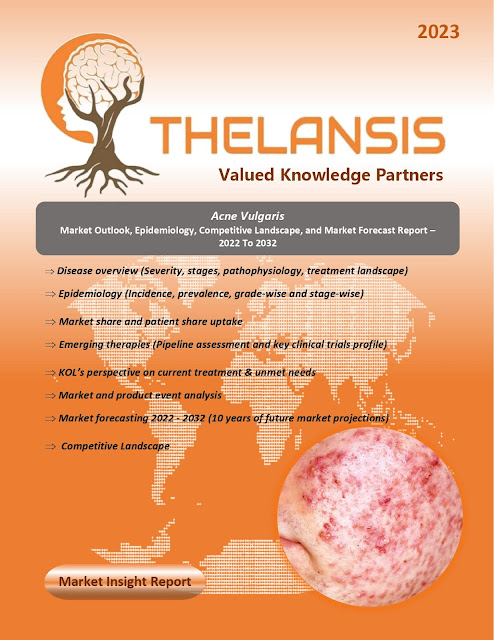Psoriasis – Market outlook, Epidemiology, Competitive Landscape and Market Forecast Report – 2020 To 2030
Psoriasis is primarily an inflammatory skin condition characterized by reactive abnormal epidermal differentiation and hyperproliferation that affects 2-3% of the world's population. The pathophysiology of the disease is primarily characterized by the activation and migration of T-cells to the dermis, which results in the release of cytokines (tumor necrosis factor-alpha, TNF-alpha in particular) that cause inflammation and rapid skin cell production. It can cause many signs and symptoms, including dry, thick, and raised patches on the skin covered with a silvery-white coating called scale, and they can tend to itch. Itching can be especially severe in certain areas, such as the scalp, lower legs, and groin. When Psoriasis affects the hands and feet, painful fissures or cracks can form, requiring the use of one's hands and walking. Severe Psoriasis on the body can also create painful fissures and can bleed. It is considered the most prevalent autoimmune disease caused by inappropriate activation of the cellular immune system. T cells get activated, migrate to the dermis, and trigger the release of cytokines that cause inflammation and the rapid production of skin cells. It is not known what initiates the activation of the T cells. This initially pointed towards a significant role of T lymphocytes as inducers of the disease phenotype. The pathogenic contribution of this cell type has been investigated in several clinical studies involving more than a dozen immune-changing biological agents in Psoriasis patients.
The prevalence of
Psoriasis varies from 2560 to 3250 cases per 100,000 populations in the USA,
with a low diagnosis rate of ~49%.
The competitive
landscape of Psoriasis includes country-specific approved and pipeline
therapies. Any asset/product-specific designation or review and Accelerated
Approval are tracked and supplemented with analyst commentary.
KOLs insights of Psoriasis
across 8 MM market from the center of Excellence/ Public/ Private hospitals
participated in the study. Insights around current treatment landscape,
epidemiology, clinical characteristics, future treatment paradigm, and Unmet
needs.
Psoriasis
Market Forecast:
Patient Based Forecast Model (MS. Excel Based Automated Dashboard) which Data
Inputs with sourcing, Market Event, and Product Event, Country specific
Forecast Model, Market uptake and patient share uptake, Attribute Analysis,
Analog Analysis, Disease burden, and pricing scenario, Summary, and Insights.
S. No Asset Company Stage
1 Cedirogant AbbVie Phase 2
2 MP1032 MetrioPharm
AG Phase 2
3 Talarozole Stiefel,
a GSK Company Phase 2
4 Bimekizumab UCB
Pharma Phase 2
5 tapinarof Dermavant
Sciences, Inc. Phase 3
6 Apremilast (CC-10004) Amgen Phase 3
7 M1095 (Sonelokimab) Avillion
LLP Phase 2
8 DUR-928 Durect Phase 2
9 LEO 80185 gel LEO
Pharma Phase 3
10 IDP-118 Dow
Pharmaceutical Sciences Phase 3
Continued




Comments
Post a Comment